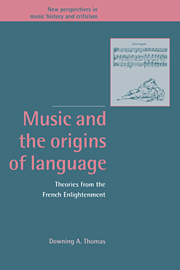Book contents
- Frontmatter
- Contents
- Acknowledgements
- Introduction
- 1 Music and language
- 2 Origins
- 3 Music theory and the genealogy of knowledge in Condillac's Essai sur l'origine des connaissances humaines
- 4 Music and original loss in Rousseau's Essai sur l'origine des langues
- 5 Sensible sounds: music and theories of the passions
- Conclusion
- Bibliography
- Index
Conclusion
Published online by Cambridge University Press: 15 December 2009
- Frontmatter
- Contents
- Acknowledgements
- Introduction
- 1 Music and language
- 2 Origins
- 3 Music theory and the genealogy of knowledge in Condillac's Essai sur l'origine des connaissances humaines
- 4 Music and original loss in Rousseau's Essai sur l'origine des langues
- 5 Sensible sounds: music and theories of the passions
- Conclusion
- Bibliography
- Index
Summary
Having largely isolated the question of the origin of signs and culture from its theological underpinnings and having placed it within a secular and hypothetical framework, eighteenth-century writers contributed to the construction of what would later be called “les sciences humaines”, the social sciences. Placing a common humanity at the center of this conjectural history, eighteenth-century essays on the question of origins attempted to explain the appearance of society and signifying practices by depicting a series of natural events which led to the conditions of the possibility of language and society. The majority of these narratives carefully avoided absolute breaks and fragmentation by claiming that all knowledge derives from our ability to perceive nature through sensation. Knowledge is continuous – a gradual building upon earlier principles, from the initial sense impressions of a hypothetical zero degree of humanity to the abstract constructions of geometry and philosophy. Condillac, in his Essai sur l'origine des connaissances humaines, invoked the metaphor of semiotic “chains or links” which had originally linked the objects of nature to simple ideas, and finally developed memory and complex thought. Condillac's argument for the natural and simultaneous development of signs and culture established a paradigm for the study of the origin of language which remained in place into the early nineteenth century. Rousseau, while viewing the development of culture and society as a series of “natural” events, nonetheless marks a series of losses which at first appear insignificant but reveal themselves to be devastating.
- Type
- Chapter
- Information
- Music and the Origins of LanguageTheories from the French Enlightenment, pp. 173 - 176Publisher: Cambridge University PressPrint publication year: 1995

